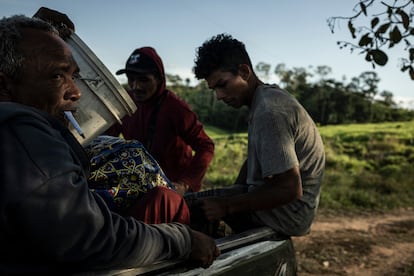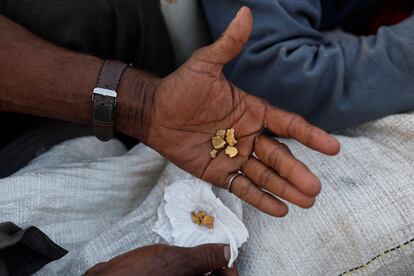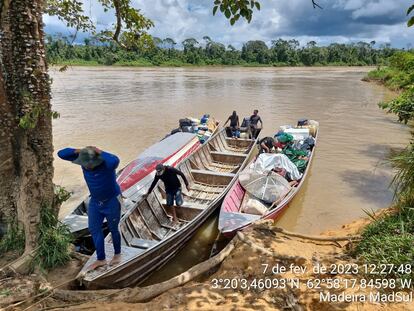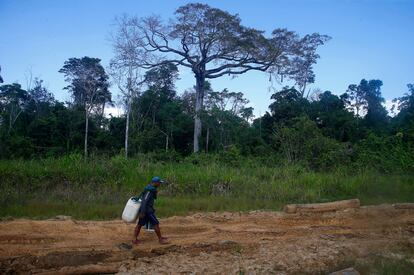Brazil launches large-scale operation against the latest gold rush on indigenous land
The new government of Lula da Silva is clamping down on the illegal mining industry in the Amazon, where the Yanomami have been severely impacted


Hundreds, perhaps thousands, of Brazilian gold prospectors have embarked on a long journey on foot and by boat through the jungle in a bid to exit Yanomami indigenous land before being arrested in the large-scale operation launched by the new government.
The estimated 20,000 poachers operating in this Amazonian territory the size of Portugal are wreaking havoc on the lives of the 28,000 Yanomami natives who inhabit it. The urgency of those escaping has driven up the price of clandestine flights as the military takes control of the airspace. There used to be around 400 daily flights, but a seat on one of these aircraft now costs around 15 grams of gold (equivalent to $800). The only other access is via the Uraricoera River.
Putting an end to the entrenched trade of illegal mining – otherwise known as garimpo – was one of the campaign promises made by President Luiz Inácio Lula da Silva who took power at the start of this year, determined that his country should once again become a model of sound environmental practice, rather than a villain.
What was once the domain of adventurous hustlers or the desperately poor – as portrayed by photographer Sebastião Salgado – is now the domain of organized criminal gangs using industrial machinery to get the gold out.
Rich in minerals, the Yanomami land – one of the largest and most inaccessible in Brazil – is located on the Venezuelan border with almost 400 villages spread over 100,000 square kilometers that have been protected by law since the 1980s.
The government’s operation involves various public agencies charged with driving out the poachers, stifling the lucrative business and addressing the health crisis caused by their presence among the Yanomami Indians –dozens of children have died from treatable diseases as a result and photos of starving children have made a strong impact on Brazilians.

The authorities have encouraged the exodus by cutting off food and fuel supply routes. Without the basics to live in the improvised villages created next to the mines, and without the fuel to operate the machinery or travel back and forth by light aircraft, the garimpeiros have fled in an “every man for himself” scenario. This week armed officers from Ibama, the environmental protection agency, confiscated and disposed of a helicopter, a light aircraft, a hangar, 5,000 liters of fuel and a ton of food. Rather than detain anyone, the Ibama officers register them.
The explicit support of the previous president, Jair Bolsonaro, for illegal mining, combined with the increase in the international price of gold and the economic crisis, unleashed a gold rush on Yanomami land and other territories populated by indigenous people. It is an activity forbidden by the Brazilian Constitution on all indigenous lands and natural reserves. The frenzied arrival of thousands of garimpeiros has intensified its harmful effects on the indigenous way of life.
According to anthropologist Luísa Molina, from the Socio-Environmental Institute, the negative impact is manifold. From the most obvious such as diseases or deforestation, to the noise of the machines interfering with hunting; from the mercury used to separate the gold, which kills the fish and poisons the natives, to the cooption of indigenous people who stop farming and fishing and make their families dependent on the food of the whites, not to mention the rape of indigenous people, sexual exploitation, insecurity due to the proliferation of weapons, and the sparking of increased internal conflicts among the natives themselves.

Yanomami leaders have been railing for years against the invasion of poachers in the absence of authorities taking any effective measures to drive them out. “Besides urgent health care, what we need most is permanent protection of our territory, especially in the border areas where the Moxihateteteas [uncontacted Yanomami] live. This must not happen again,” says Davi Kopenawa in a statement from the NGO Survival International.
Indigenous leaders estimate that, before the current operation, the garimpeiros numbered about 20,000. They were “monitored by satellite and overflights,” explains Molina. “Cutting off their fuel supply is essential to encouraging their departure, but it is also necessary to block the accesses, disable the airstrips, and control air traffic.” Molina also considers it essential to introduce controls in the gold buying and selling chain.
The lack of control in this area gives rise to scandalous situations. The state of Roraima, where the Yanomami land is located, exported gold in 2019 despite not having a single legal mine. Mining in general, legal and illegal, has experienced a sharp increase in Brazil. The area from which minerals are extracted has increased sixfold in 35 years. Three out of four exploited territories are in the Amazon and, even more shockingly, in 2020, illegal operations surpassed legal ones, according to a detailed report by Mapbiomas – this, just one year after the rise to power of Bolsonaro who prioritized the economic exploitation of the Amazon over ecological protection.
Lula’s government has focused on this corner of Brazil where the Yanomami live because of the serious health crisis, but, Molina stresses, this is a problem that also exists in other indigenous reserves in states such as Pará and Mato Grosso.

Illegal mining is no longer an artisan trade. The industrial nature of contemporary illegal mining requires labor – usually sourced from poverty-stricken areas – to operate the mining machines, but it also requires individuals to captain boats, pilot planes and cook. There are so many people involved that entire villages have sprung up with small stores, bars, cabarets and brothels. Payment in gold is the order of the day.
In the case of the Yanomami, the arrival of thousands of white men in search of gold and other precious minerals such as cassiterite from which tin is extracted, together with the fact that Bolsonaro’s government invested minimal resources in health care in the region, has triggered a serious health crisis. A doctor working there explained to the magazine Piauí that she left the Yanomami after a year for fear of dying herself due to the increase in violence and the fact that undesirable and expensive solutions had to be sought in the absence of basic health care resources: “I had to ask for an air transfer for a patient with malaria because there was no medication,” she explains after reporting that “most of the health clinics were out of stock.” Without gloves, masks, stretchers, oxygen or intravenous drugs, patients who could have been treated on the spot for common and preventable diseases had to be evacuated by helicopter.
While dozens of doctors and nurses have been deployed to attend to the Yanomami and food parcels are being dropped from the air, the seriously ill have been transferred to the city. At the same time, there is an exodus of illegal miners, though it is not known whether they will flee to Venezuela, to other indigenous lands and natural reserves, or if they will receive some kind of social aid as proposed by the governor of Roraima, where one out of 10 inhabitants lives off the gold prospecting. The laborers flee on foot. The business owners probably by plane. They will keep a low profile until the storm passes or the authorities take action against them.

Sign up for our weekly newsletter to get more English-language news coverage from EL PAÍS USA Edition
Tu suscripción se está usando en otro dispositivo
¿Quieres añadir otro usuario a tu suscripción?
Si continúas leyendo en este dispositivo, no se podrá leer en el otro.
FlechaTu suscripción se está usando en otro dispositivo y solo puedes acceder a EL PAÍS desde un dispositivo a la vez.
Si quieres compartir tu cuenta, cambia tu suscripción a la modalidad Premium, así podrás añadir otro usuario. Cada uno accederá con su propia cuenta de email, lo que os permitirá personalizar vuestra experiencia en EL PAÍS.
¿Tienes una suscripción de empresa? Accede aquí para contratar más cuentas.
En el caso de no saber quién está usando tu cuenta, te recomendamos cambiar tu contraseña aquí.
Si decides continuar compartiendo tu cuenta, este mensaje se mostrará en tu dispositivo y en el de la otra persona que está usando tu cuenta de forma indefinida, afectando a tu experiencia de lectura. Puedes consultar aquí los términos y condiciones de la suscripción digital.








































